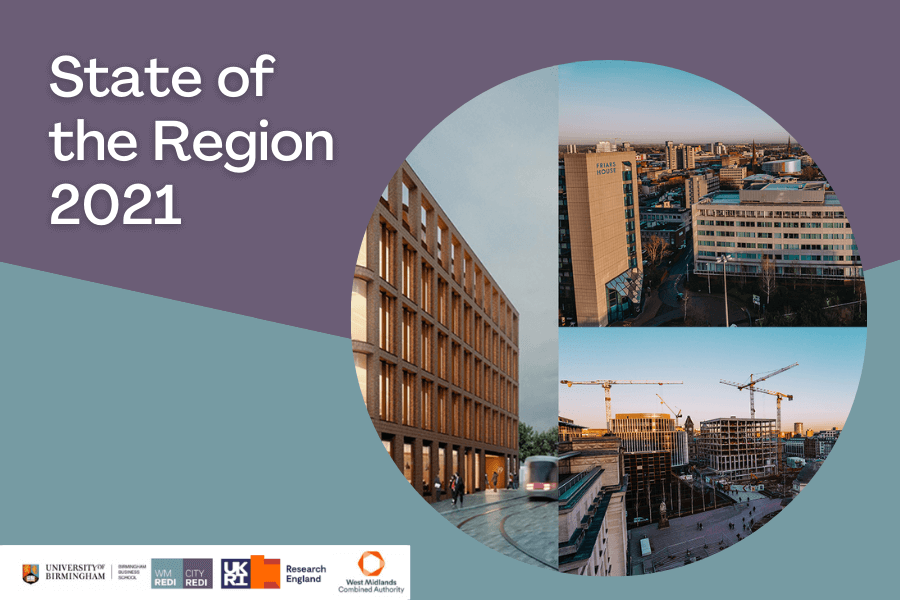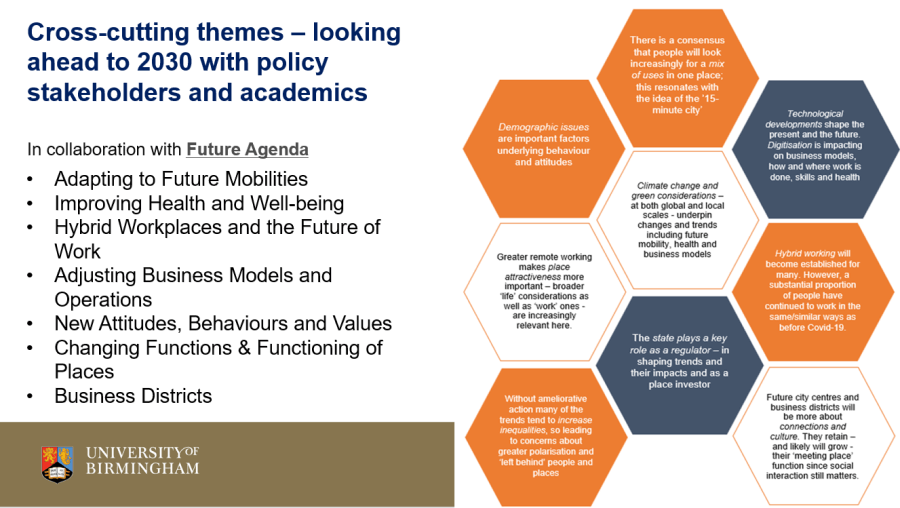On the 4th August, WMREDI hosted the launch of the State of the Region Report. This report is written on behalf of the West Midlands Combined Authority (WMCA), and all its partners, by the WMREDI partnership. It presents a balanced approach to regional monitoring and is a useful tool to understand the progress the region is making.
The West Midlands and the WMREDI Partnership
The event began with a ‘Welcome and introduction to WMREDI’ by Professor Richard Black, Pro-Vice-Chancellor, Head of the College of Social Sciences, University of Birmingham. Richard introduced the context behind the report: “a year of unusual circumstances and change, both from a policy and data perspective”. Outlining how the report provides a stocktake of the last 12 months for the region, against the backdrop of rapidly changing conditions and policy. This builds on weekly monitoring that WMREDI and partners have been doing throughout the pandemic.
Jonathan Skinner, Head of Economy and Local Industrial Strategy at West Midlands Combined Authority presented the purpose of the State of the Region report and how it informs decision-making. Jonathan began his presentation by stating that “much of the value of the strength of the region report lies in the strength of the (WMREDI) partnership” and he praised the capacity and rigour of WMREDI for looking at data and bringing it together in an independent way. This is especially important to the West Midlands Combined Authority, which has a requirement to maintain an economic assessment of the area. Jonathan provided the following three reasons for why the State of the Region report is important to regional policymakers:
- Partners needs a shared ‘single version of the truth’ or a shared understanding of what the evidence base is and how this can be interpreted. The mix of the types of different evidence that are in the State of the Region report is really to help with regional policymaking.
- The need to use the evidence base to understand the changes we are starting to see in the region.
- We need to track those changes over time. With a view of thinking about what might happen in the future.
Jonathan explained that the data in the report could be used by political and business leaders to think about their own priorities and challenges for the future and how they can contribute to addressing the issues raised in the report.
 Skills in the West Midlands
Skills in the West Midlands
Next, Alex Smith, Senior Data Analyst, WMCA presented evidence from the Skills Advisory Panel Evidence Report. The Local Skills Report provides a detailed analysis of the West Midlands education and skills system, how it is structured and funded, and how effectively it provides skills to meet the needs of its citizens and the job market. It was published in April 2021. First, it provides a data dashboard, setting out key trends in claimants count, qualification levels, school and early years attainment, and the gender pay gap. The body of the report consists of an analysis of the supply of skills, demand for skills, and then a comparison of the two. Alex outlined the key findings from the report focussing on:
- education and skills (policy challenges);
- skills funding;
- qualification levels;
- skills supply and demand.
Alex ended his presentation by posing the following key question for the audience to consider:
- How can we provide integrated support for digital and complex analytical skills that across many sectors may displace current business models and practises?
- How can we retain graduates, and particularly postgraduates, which the region produces in large numbers and yet is short of in the labour market?
- COVID-19 has hit apprenticeships delivered by all but the largest providers. How can we support small firms in retaining and taking on apprentices?
- Which specific jobs are at greatest risk of becoming redundant, and how might the skills needed for these roles be apply to the jobs of the future?
- Consequently, what pathways for retraining should we forge to connect workers aged 25+ to compatible occupations?
Megatrends and the Future of Cities
Professor Anne Green, City-REDI / WMREDI, University of Birmingham then presented on ‘Megatrends and the Future of Cities’. Megatrends are major movements, patterns or trends that have a transformative impact on business, economy, society, cultures and personal lives and affect us all in the medium-and longer-term. Examples include technological change (notably digitalisation), the transition to Net Zero, and demographic change. She highlighted the shift to hybrid working and what a reduced number of days office workers spend in city centres mean for future cities, as well as the challenges and opportunities of developing a sense of place and developing an urban realm that is attractive for residents and businesses alike and for a range of uses: commercial, retail, residential and leisure. She outlined opportunities regarding green issues, sustainability and health, and also business models and technology – including the geographical expansion of the skills base, while the capacity of some individuals to take advantage of these opportunities poses a threat to building more inclusive cities.
 The West Midland Data Lab
The West Midland Data Lab
Next, Professor Delma Dwight, Director, Midlands Engine Observatory and Director of Economic Intelligence, Black Country Economic Intelligence Unit) introduced the West Midlands Data Lab. This new lab puts the power of data and research at the fingertips of diverse partners from across the region. The hub will be a single interactive portal to access up to date research data and expert insights. It is aimed to help partners make informed decisions around key investments, helping policy formulation for economic and social benefit in the West Midlands. Delma took the audience on a tour of the site, showcasing specific projects, data dashboards and headline briefings.
Visit the West Midland Data Lab
Challenges Facing the Region in the Next 12 Months
Finally, Professor Simon Collison, Director of City-REDI / WMREDI and Deputy Pro-Vice-Chancellor, University of Birmingham chaired a panel discussion on “Post COVID and post-Brexit future – Challenges facing the region in the next 12 months”. The panel included Roger Mendonca, CEO of West Midlands Growth Company, Henrietta Breukelaar (Director of economic strategy at GBSLEP) and Paula Deas (Coventry and Warwickshire LEP – operations and policy director). When focussing on the challenges facing their organisations, Roger Mendonca discussed the inward investment agenda and the negative effect of the loss of business tourism. However, he was positive about the prospects for continued inward and indigenous investment in the region. Henrietta Breukelaar warned that we are adjusting to a new reality, which is not just about straightforward recovery. This comes with both challenges and real opportunities. Henrietta spoke of the real ongoing investments in green jobs / clean growth and the opportunities to galvanise the diversity and enthusiasm of our young population. Paula Deas also believes that the Green agenda will be the central plank of UK recovery and ‘building back better’, which is positive since the region has demonstrated growth in these key sectors. Paula also commented on the massive opportunity from the electrification agenda, as well as, the possibilities created from Coventry being the City of Culture.
Professor Simon Collinson closed the event with some final thoughts. He brought the discussion back to skills and the need for the region to remain attractive to retaining skills and talent. Simon also suggested that we need to think about incentivising local firms to look at their own training needs. This was supported by the panel members. The discussion ended with a feeling of positivity around it being the right time to restructure our fantastic region and move forward in addressing our key challenges.
This blog was written by Dr Chloe Billing, Research Fellow, City-REDI / WM REDI, University of Birmingham.
To sign up for our blog mailing list, please click here.
Disclaimer:
The views expressed in this analysis post are those of the authors and not necessarily those of City-REDI / WM REDI or the University of Birmingham
